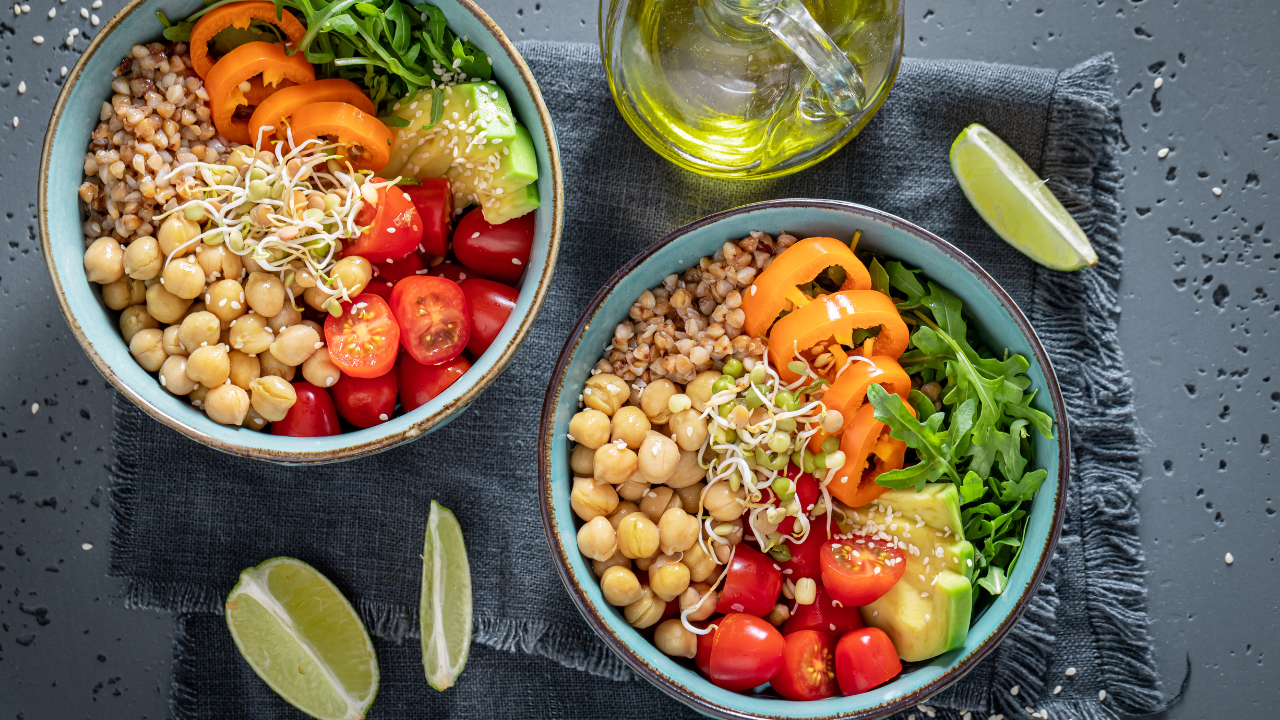The 10 Principles of Intuitive Eating
DISCLAIMER: Links included in this blog might be affiliate links. Health with Hannah, LLC is a participant in the Amazon Services LLC Associates Program along with other affiliate programs. If you purchase a product or service with the links that I provide I may receive a small commission with no additional charge to you. Thank you for your support!
What is intuitive eating?
Intuitive eating is an anti-diet (also referred to as non-diet) approach to eating that was developed in 1995 by two registered dietitians, Evelyn Tribole and Elyse Resch. I highly recommend the Intuitive Eating book as a resource to learn all abut the practice.
Intuitive eating is not a diet. I like to call it a practice or a journey. It is not a set of rules that you must follow and it’s also important to note that you cannot do intuitive eating “wrong”. What a relief, right?
There are 10 principles of intuitive eating that revolve around helping you improve your relationship with food and your body.
What are the 10 principles of intuitive eating?
Reject the Diet Mentality
This principle is all about rejecting the idea of losing weight quickly, easily, and/or permanently. Our bodies are meant to change. Weight loss is not the focus of intuitive eating and it is not a weight loss diet in any way.
This principle involves you getting angry at diet culture. It involves you getting mad that there are diets out there that are trying to manipulate you into losing weight, knowing full well that you are likely going to gain that weight back.
When you start to accept intuitive eating and you still partially believe that there may be some diet around the corner waiting for you that is actually going to be the one that works, that is going to make it very difficult for you to fully adopt the idea of intuitive eating. You need to fully reject the idea of diets and the diet mentality in order to move on as an intuitive eater.
Learn more about principle 1 here.
2. Honor Your Hunger
Simply put, you need to eat enough. Eating as little as possible is not the solution and this is going to backfire. You need to eat enough calories, you need to eat enough carbs, enough protein, enough vitamins and minerals. You need to be eating enough.
Try not to let yourself get excessively hungry because when this happens, all rationale goes out the window. When we get really hungry, we are less likely to eat mindfully and may end up eating past fullness.
Be sure to listen for when your body tells you it is hungry and respond by feeding it. This is going to be a very important step to help you rebuild trust with your body. Your body tells you what it needs and if you don’t respond appropriately, it can be hard to build trust. If you have been dieting for years, it may take time to rebuild this trust and tune back into those hunger and satisfaction cues.
3. Make Peace with Food
Give yourself unconditional permission to eat all foods. This includes any foods that you deem as “bad” or “unhealthy”. You need to truly give yourself permission to eat these (and all) foods.
When you tell yourself that you can’t have those forbidden foods, that only makes you want them more. This often leads to you eating past fullness when you finally get the chance to have them.
When you do finally allow yourself to give in to these forbidden foods as you accept intuitive eating, it might be difficult to stop eating them at first. This is normal! It is called the honeymoon phase and it won’t last forever. Pretty soon, all foods will be equal in your mind and you won’t feel the need to eat portions that don’t feel good for you.
Learn more about principle 3 here.
4. Challenge the Food Police
You need to say “no” to the voices in your head telling you that you can’t eat something or to those around you that say you can’t eat something or judge you for eating. If the voice in your head tells you that you are being “bad” for eating a cookie and “good” for eating some broccoli, you need to challenge that and remember that food has no moral value and you can enjoy both in moderation.
If friends, family, and/or coworkers are acting as the food police, it likely is a reflection of their own relationship with food. Don’t let anyone make you feel bad about your food choices.
Learn more about principle 4 here.
5. Discover the Satisfaction Factor
Food is so much more than just fuel. We need to eat both for physical satisfaction and for emotional satisfaction. Enjoying delicious food is part of the human experience. We can enjoy foods that nourish both our bodies and our souls.
Food is culturally meant to bring us together! For me, it is pretty hard to bond with friends and family over a plain salad with no dressing.
People often feel fearful that when they are allowed to enjoy these “fun” foods or “forbidden” foods that they may have a hard time controlling themselves around them. And this may be the case at first, but the more you allow all foods, the less that you are going to want to overeat them.
6. Feel Your Fullness
We want to eat to the point of feeling satisfied, not stuffed. This becomes rather difficult when we aren’t sure if/when we are going to get that food again or when we wait to long to eat.
You want to eat to the point where you feel comfortable and you could eat a little bit more, but if you did you would likely feel a tad uncomfortable. This is the feeling of satisfaction that you want to shoot for.
There are times that you will overeat and that is normal. You should not restrict after this or feel guilty.
In terms of hunger, we also don’t want to get too hungry because that makes us more likely to overeat and it makes it hard for our body to trust us when it always feels hungry without getting fed. Try to allow yourself to only get to a point where you feel slightly hungry and then eat to the point of satisfaction.
This takes time to learn to how to not get too full or too hungry! Be sure to eat slow, avoid distractions while eating, maybe put your fork down while eating to assess. If you feel satisfied, stop eating! The “clean plate club” is no longer a thing and you don’t have to finish your food if you feel satisfied.
Learn more about principle 6 here.
7. Cope with Your Emotions with Kindness
It is important to find other ways than with food to cope with emotions (anger, sadness, boredom, etc.). It is normal to cope with food on occasion and you don’t need to restrict or feel guilty if you do emotionally eat once in a while. But food is not going to solve the problem and you truly must deal with whatever is causing those emotions.
Learn more about principle 7 here.
8. Respect Your Body
Every single body looks different. If you were to eat the exact same and exercise the exact same as someone, you would still look completely different. We all have very different genetic blueprints.
Get clothes that you feel comfortable in. Don’t try to squeeze into a small just because you feel like that is the “right” size. If you wear a size 9 shoe, do you try to make your feet into a size 6?
It makes sense that you may want to change your body, as we are often taught that our bodies are “wrong”. But it is important to respect your body at all the shapes and sizes that it goes through. All bodies deserve dignity.
As for BMI and ideal body weight - they are simply diagnostic tools and they are not meant to tell you what your body weight should be. There really is no way to predict what your ideal body weight is or what your weight should be. But when you are eating properly and moving in ways that feel good, you will settle at the weight you are meant to be at and it may or may not be within the BMI range that is “healthy” for you.
Learn more about principle 8 here.
9. Movement - Feel the Difference
Exercise in ways that feel good. Don’t exercise to punish yourself. Shift your focus from exercising to lose weight and burn calories to exercising to feel good. If you focus on how you actually feel during a workout rather than what you are getting from it, it is more likely to feel less like a chore and more like something you actually want to do.
Find movement you actually enjoy. If you don’t like running, don’t run! Find a mode of exercise that you actually want to do.
Learn more about principle 9 here.
10. Honor Your Health - Gentle Nutrition
Intuitive eating does not mean that you are going to just eat donuts, pizza, and ice cream all day long - that wouldn’t feel very good. We don’t neglect our health when we adopt intuitive eating. We still are going to eat foods that nourish our bodies. The difference is that you can also eat foods like cookies and pizza without guilt or shame.
Don’t strive for perfection. There is no such thing as being a “perfect” eater and there is no “perfect” diet. Instead, focus on progress. For example, if you do eat past fullness, take a mental note of why that happened. Did you get too hungry? Were you on your phone while eating and you couldn’t be as mindful of your satisfaction cues?
Look at everything that you do “wrong” as a learning opportunity rather than punishing yourself. Remember, you don’t have to eat “perfectly” to be healthy. You are not going to get a nutrient deficiency or become “unhealthy” from one snack, one meal, or even one day of eating. It is all about the big picture and what you are doing most of the time.
Gentle nutrition happens to be my favorite principle of intuitive eating. So much so that I created an entire ebook all about it!
Learn more about principle 10 here.
Bottom line
Intuitive eating is a non-diet approach to nutrition with a 10 principle framework. This post only scratches the surface of what intuitive is all about and if you want to learn more about getting started, check out this post here.

































